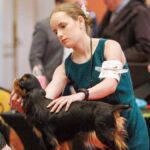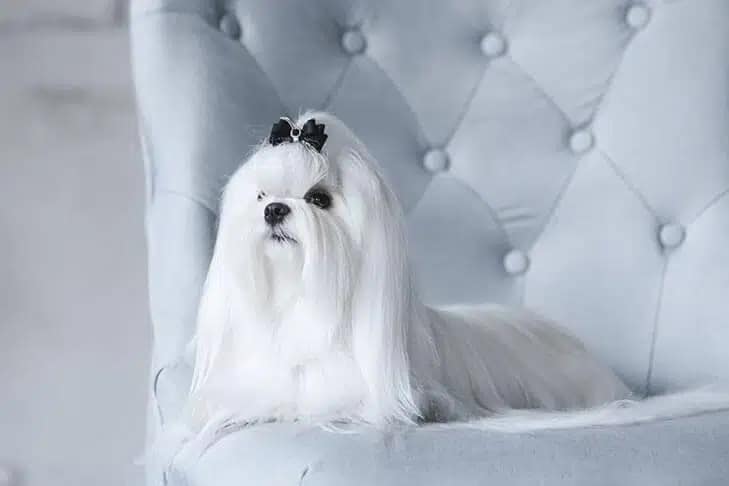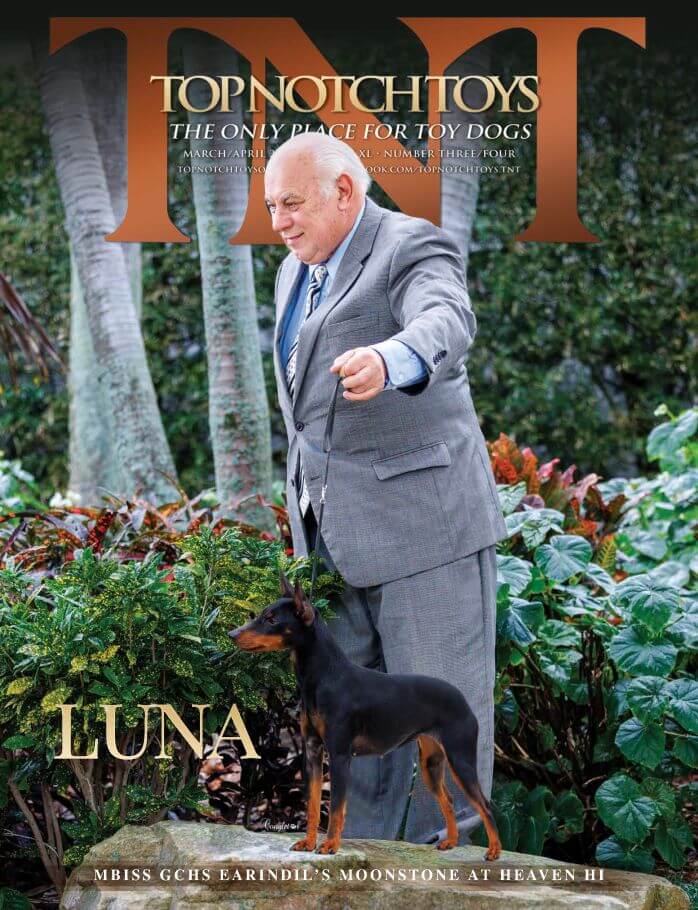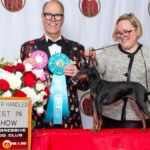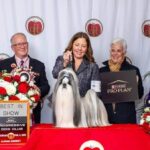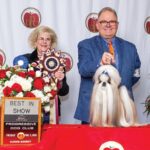Interview with a Toy Group Judge Vicki Abbott
Where do I live? How many years in dogs? How many years as a judge?
Vicki Abbott: I live in Fairview, Texas, which is just north of Dallas. I have been in dogs for over 45 years, first as a breeder/owner-handler, and then as a professional handler for many years, concentrating on the Toy Breeds. I am most well-known for the many Maltese that I handled in the past, especially the No. 1 Maltese Dog of all time and Westminster Group Winner, Ch. Sand Island Small Kraft Lite. I have been a judge for 21 years.
What is my original breed? What is/was my kennel name?
Vicki Abbott: My original breed is Maltese, although I also bred Pekingese and Shiba Inu.
My kennel name is Scylla. While I originally started the kennel in the 1970s, it became a family endeavor, including my husband, Larry, and my daughter, Tara Martin Rowell, and her husband, JD.
Can I list a few of the notable dogs I’ve bred? Any performance or parent club titles?
Vicki Abbott: We have bred many Group-Winning and Best in Show Maltese that have held the title of No. 1 Maltese over the years. The one I am proudest of, that I handled but did not breed, was Ch. Sand Island Small Kraft Lite, bred by Carol F. Andersen. “Henry” won the Toy Group at Westminster in 1992, was the top-winning Maltese Dog of all time, No. 1 Toy Dog for several years, No. 5 among All Breeds, and he is the ancestor now to many of our dogs at Scylla. Because of that, I am very proud of his offspring (combination with our Scylla Maltese). His great-grandson, Ch. Scylla’s Small Kraft Re-Lit, “Hank,” was bred by Scylla Kennels and remains the top-winning Group and Best in Show winning Maltese in this millennium—handled by my daughter, Tara Martin Rowell.
What are some of the qualities I most admire in the Toy Breeds?
Vicki Abbott: They are just big dogs in little bodies. They have no clue that they are small! That is what makes them endearing. They will try anything, and usually achieve it, and they are excellent companions.
Have I judged any Toy Breed Specialties?
Vicki Abbott: I have had the honor of judging many Toy Breed Specialties over the years, and am constantly rewarded with quality entries of dogs to choose from all over the country.
It is the highest honor to be invited to judge a National Specialty. Being asked to judge a National Specialty is about those breeders entrusting their very best from that year to you as a judge. It is a lot of fun and a great responsibility!
Can I offer any advice to exhibitors regarding the presentation of these “table” breeds?
Vicki Abbott: Presentation, of course, can make a mediocre exhibit look great, or a great exhibit look less desirable, until you actually have the dog on the table to go over it and weigh all the factors involved. I expect the dogs that come into my ring to be clean and groomed—but I do not expect them to be perfect. They should be bathed, brushed, and de-matted, eyes should be clear, and the dog should have clean teeth. There are a lot of exhibitors who show and groom their own dogs and are not professionals, and sometimes, the best dog in the ring is not the most perfectly groomed. But there is more to the choice than just the grooming. Conditioning means many things, including being in the right weight and muscle tone, even in a Toy Dog. So often you hear that Toy Dogs don’t have to really do anything other than be companion animals, so consideration of how they move, are put together, or their condition is secondary and does not really matter. Oh, but it does. You can have the typiest, showiest Toy Dog, but if that dog has definite structure problems, you can bet it is not going to serve the purpose for which it was bred—to be a good companion. A dog with bad hips, unbalanced angulation in the front and rear, knees that need operations later, or even a mouth with horrible teeth will eventually be a dog in pain and on medication. This does not a happy Toy companion make! The temperament on a dog that is in pain all the time will obviously deteriorate the more pain that he is in. Eventually, the lifespan of dogs with structure problems can be much less than those put together correctly. Toy breeds are the long-livers of the dog world; these little guys can act like puppies for years and live to the ripe-old ages of 15-17 years.
Much progress has been made in presentation by owner-handlers and professionals alike, especially in the area of coat presentation, as there are many different coat types in this Group. Coming from a drop-coated breed like Maltese and having shown and groomed many others as well, I know the dedication it takes to not only breed a good dog, but to learn how to present it in good condition. So, when someone puts a very nicely groomed Toy Dog on the table in my ring, no matter what the coat type, I can appreciate the time and effort that went into that! Newcomers are so welcome to this Group, and the two best things to do to learn how to best present your dog are to ask for assistance by a good mentor in your breed, as far as the grooming, and to watch how your Toy breed is presented on the table by experienced exhibitors at a show. The thing that I, as a Toy Breed judge, find quite frequently is Toy Breeds that are not trained to stand for examination or have their mouths shown by the owner or handler. Toy judges should always take care that if a puppy has a problem, not to give them a bad experience in the ring. Being heavy-handed, or trying to pry into small mouths, is not a good idea. I make it a practice to judge the mouth/bite at the very end of the examination, which seems to help with the occasional wiggly “happy to see you” puppy or sensitive adult. Exhibitors can assist by having their dogs trained to stand and have their mouths examined, whether it is a thumb exam by the judge or where the lips are opened to check the bite by either the judge or exhibitor. Again, mouth exams on a Toy Dog should be done quickly. Having your Toy Dog prepared for this ahead of time will be a great asset in the ring for both the exhibitor and the judge.
Some longtime exhibitors have “downsized” to Toys. In my opinion, has this had an impact on quality?
Vicki Abbott: Positive changes! While we once had certain less popular breeds like Affenpinschers, Brussels Griffons, and English Toy Spaniels, just to name a few, that were not well-represented with a lot of quality, that has now changed for the better, thanks to dedicated breeders who have spent so much of their lives improving these breeds. That, in addition to the continued dedication of breeders of the other Toys in the Group, is what has made this Group so competitive. We welcome experienced breeders from other Groups who are interested in putting in the time, experience, and effort needed to breed good Toy Dogs.
Toy Breeds can require special care. Do I have any advice to offer breeders, exhibitors, and judges?
Vicki Abbott: One thing that I think all Toy breeders and exhibitors would like for Toy judges to understand is that you have to be considerate of the smaller breeds during examination. It is not necessary to apply undue pressure on the dogs, squeeze parts of their bodies, or mess up the hair that took the exhibitor hours to prepare for you to look at! There are ways to go over these little ones, and it behooves every potential Toy judge to learn this at seminars or from mentors. This would include how to approach the dog, go over bites, heads, tails, and coats in a way that is appropriate for the breed. You will be much appreciated for your attention to this detail.
These diminutive dogs have made for loving companions since they were first bred centuries ago. There is much variety in this Group from breed to breed. Some are of ancient lapdog types, and some are small versions of hunting dogs, Spitz, or Terrier types, bred down in size for a particular kind of work or to create a pet of convenient size. Because of this variety, the most important consideration when judging this Group is type.
My best advice to breeders and/or exhibitors is to please study your standard! You would be surprised how many times, in speaking with an exhibitor after judging, I have asked if they have read their standard—and the answer is no, or not lately! You cannot understand how to improve your breeding program or know why your dog probably did not win on the day if you don’t know what your standard requires. Good books on your breed, and breeding in general, are a good idea to have and keep as references. Also, find someone whose breeding program you respect and learn everything you can from them. A good mentor is priceless and will steer you in the right direction, even if it is not with them.
In my opinion, how do today’s exhibits compare with the Toy Dogs of the past?
Vicki Abbott: Well, I’m a little biased, having competed in this Group for so many years, but my opinion is that the Toy Group is, and has been for a very long time, one of the strongest Groups, with great overall quality. Toy Groups are most always deep, and it is such a joy to judge any National Toy Dog Specialty where you can actually see the quality of the breeding programs.
Why do I think Toy Dogs can become outstanding Show Dogs?
Vicki Abbott: Toy Dogs were bred to be companion animals, and therefore, are very excited about being near, and pleasing, their owners. Toy Dogs will do just about anything you ask of them, just as long as they can be by your side. Their attentiveness and eagerness to please are what make them not only good show dogs, but sometimes clowns in the ring. They are very entertaining and creative. It is always a fun day to judge the Toy Breeds!
If I could share my life with only one Toy Breed, which would it be and why?
Vicki Abbott: Obviously, this would be a Maltese. I enjoyed handling many of the Toy breeds and have owned quite a few, but there is nothing like the little silky white dog with the black eyes and nose!
Just for laughs, do I have a funny story that I can share about my experiences judging the Toy Group?
Vicki Abbott: One time, in the early 1990s, I was showing the Maltese, “Henry,” at a local all-breed show where the Best in Show judge asked that I take the dog on an “L” pattern on a loose lead. I headed down and then across, turned around, and the dog took off by himself, putting every foot down right, all the way back to the judge on the mats. He stopped and baited, then turned around and barked at me while I was catching up to him. He was very proud of himself. As I arrived back at the judge and picked up the lead, all I could say was, “Well, at least it was on a loose lead!” Needless to say, we ended up with the red, white, and blue ribbon. Since then, I have seen this attitude from all the Toy Breeds from time to time in my ring, and it is always quite entertaining and reminds me why I love this Group so much. For anyone who would question it, Toy Dogs are indeed very smart; there’s always a clown in the bunch, and humor can always be found at the Toy rings!
